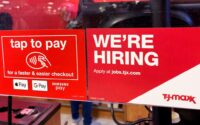Messenger leader Richard Beckman exits news site amid layoffs
The president of embattled news startup the Messenger said Tuesday he is leaving the company as it begins a fresh wave of layoffs.
Richard Beckman, a former Conde Nast executive whose hard-charging business style earned him the nickname “Mad Dog,” was responsible for drumming up revenue for the website, which launched last May.
Prior to the Messenger’s launch, Beckman boldly claimed in a New York Times profile that the site would generate more than $100 million in revenue in 2024, reel in 100 million monthly readers and hire hundreds of reporters across the country.
But sources close to the situation said Beckman fell “very short” of those goals and that he and Messenger founder and CEO Jimmy Finkelstein “did not see eye to eye” over how to run the struggling business.
After Beckman announced his exit, Finkelstein sent a memo to staff about impending layoffs while claiming the site’s traffic “continues to grow exponentially, with ComScore reporting 88 million page views in November, and we will be higher in December.”
However, a source with knowledge told The Post the startup had about 12.5 million unique visitors in November.
A media insider laughed off Finkelstein’s reliance on page views — as opposed to unique visits, which serves as a true measure of a site’s reach.
“Not only is Jimmy a terrible boss, but he also can’t count,” the source told The Post.
“Don’t shoot the messenger, Jimmy, but websites are scored by unique views.”
Finkelstein also confirmed the company would “reduce the size of our organization by approximately 20 people across business and editorial” in the memo obtained by The Post.
“I understand this is hard, and I am genuinely sorry for those impacted,” he wrote.
Reps for the Messenger and Beckman didn’t respond to a request for comment.
The layoffs come as the Messenger is in the midst of its second-round capital raise.
In memo on LinkedIn Tuesday, Beckman wrote that he told Finkelstein in November that he would be stepping down on Jan. 31, but would remain an investor in the company.
“Back in November I had advised Jimmy Finkelstein of my decision to step down based on short term health issues I have endured this past year and will be subsequently retiring from the corporate world at the end of this month,” he wrote, adding that he will be “helping with the transition” in the next few weeks.
Beckman said he plans to return to England with his wife at the end of 2024 and continue some advisory and board work.
The North London native reflected on his high-flying 24-year career at Conde Nast — the owner of Vogue, GQ, the New Yorker and Vanity Fair — where his aggressive reputation was both an asset and a liability.
At his height, he held the role of president of the storied magazine publisher, where he grew revenues for its 27 properties.
His low point, however, made headlines when he tried to make two co-workers — a Vogue advertising director and a Vogue fashion director — kiss after an ad sales meeting in 1999.
Beckman ended up banging the executives’ heads together — and breaking one of their noses, forcing Conde to pay a seven-figure settlement.
Beckman was forced to apologize and attend counseling.
His career at the publisher continued to soar, regardless, and he left in 2009, after holding the role of CEO of Fairchild Fashion Group, which included Women’s Wear Daily and W Magazine.
He held other high-profile jobs including chief revenue officer of Vice Media and president of the Hill, which Finkelstein owned and sold for $130 million to Nexstar in 2021.
Ahead of the Messenger’s launch, critics told The Post in March that Beckman’s “pie-in-the-sky” growth projections were “delusional” and that the $50 million that Finkelstein raised to launch the site is “only a fraction” of the bill required to cultivate a first-rate media property.
Shortly after the site launched, journalists began fleeing the Messenger, griping that they joined the site to do original reporting but that they were mostly aggregating clickbait news stories in order to drum up traffic for ad dollars.
Meanwhile, Beckman, who had crowed about the windfall of cash the site would bring in, told employees this fall that the site was “out of money,” the Daily Beast reported.


